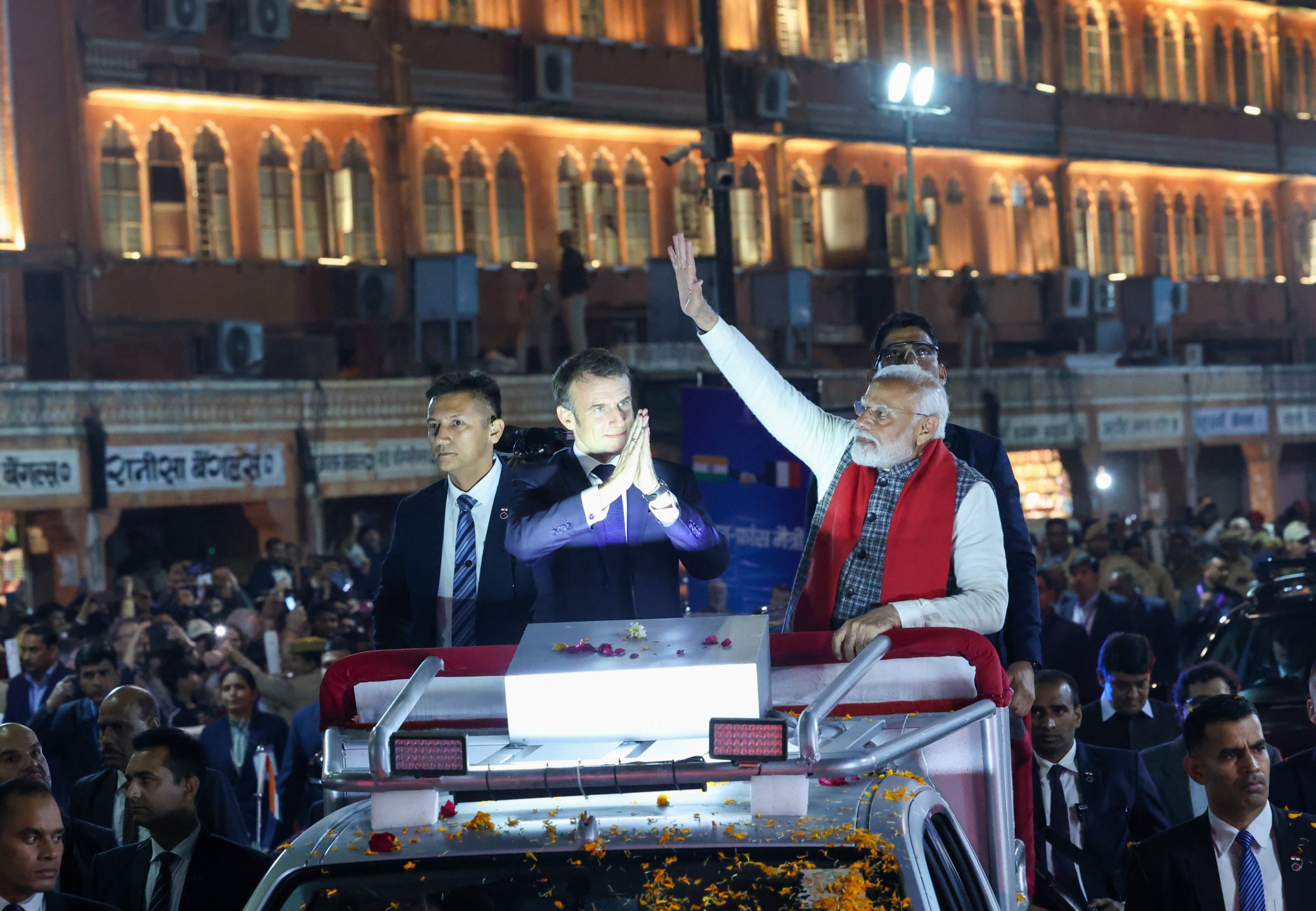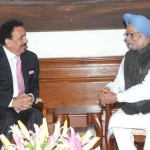IDR Blog
The Strong Political Message Behind Macron's India Visit
President Emmanuel Macron’s visit to India as chief guest at our Republic Day celebrations had a ceremonial aspect, no doubt, but in relations between states ceremonial gestures convey a message at many levels – of an honour deserved, importance of the relationship, an investment into the future, expected benefits, a signal to others, and the like.
When Prime Minister Modi was fêted by President Joe Biden during his visit to the US in June 2023, it conveyed a strong political message at the bilateral and international levels, of the US wooing India for larger strategic goals. Ceremony is part of diplomacy and is not without substance.
Modi himself was Guest of Honour on Bastille Day (July 14) in Paris in 2023. That honour was to convey France’s desire to build stronger all-round ties with India. It was an investment in the future in view of India’s growing economy, its diplomatic prowess, and shared strategic interests in the Indo-Pacific in particular. Building more common ground with India on climate change issues, which is a prime area of debate and concern in French society (Modi and Macron reaffirmed in the joint statement their commitment to come forward in their next nationally determined contributions with ambitious targets, with France commending India’s offer to host COP 33 in 2028) is an important French objective. So is leveraging French capabilities to foster links with increasing Indian capabilities in the areas of defence, advanced technologies and the digital domain, using India as a springboard for reaching out more to the Global South, which is becoming more vocal and demanding with regard to its interests in the hitherto west-dominated global system.
The joint statement says explicitly, “Defense and security partnership has been the cornerstone of the India-France partnership in the Indo-Pacific region”. This is meaningful, as the security threat in this region emanates from China. In fact, in his banquet speech, Macron referred to the activities of “some hegemonic powers” in the Indo-Pacific. The two sides have also agreed to intensify their cooperation in the Southwest Indian Ocean, building on the joint surveillance missions carried out from La Reunion in 2020 and 2022. Significantly, they plan to extend those interactions in India’s maritime neighbourhood to contribute positively to the securitisation of strategic sea lanes of communication. The two sides have also committed to revitalizing the trilateral cooperation with Australia, deepen the one with UAE, and explore new ones in the region. They have agreed to explore opportunities for coordinating economic projects and programmes in the Pacific, which marks an extension of India’s role in the Indo-Pacific.
The joint statement notes that “since the declaration of the Strategic Partnership in 1998, India and France have developed a partnership of exceptional trust and confidence, consistency and strength”. The word “exceptional” is noteworthy. The references to “strategic autonomy” and “a shared commitment to a multipolar world” may seem predictable phrases, but they do convey the desire of both sides to exercise some independence at the strategic level, consonant with their national interests. Macron, for instance, is of the view that US policy on Taiwan is needlessly provocative and that France does not want to be a camp follower of the US in such questionable policies. This implies that France understands India’s decision to protect its strategic ties with Russia even though France itself is increasingly at loggerheads with Moscow over the Ukraine conflict. The wording on the Ukraine conflict in the joint statement is careful and does not depart from the established Indian position.
The commitment to a multipolar world has been expressed by India and France over the years. For France it means a world that is not dominated entirely by the US and one in which Europe plays a strategic role, separate from the US based on its own priorities and interests, even if it is in partnership with the US when required. For India, multipolarity is essential for global rebalancing, to achieve UN, IMF and World Bank reforms, and for giving more weight to developing countries in international governance. India joins the BRICS and the SCO is support of multipolarity with this objective. India, of course, emphasises multipolarity in Asia as an essential step towards a multipolar world.
The joint statement affirms France’s support for India’s candidacy to the International Energy Agency. The two countries have agreed to institute a Comprehensive Dialogue on Global Issues. The urgent need for the reform of the United Nations Security Council and the early commencement of text-based negotiations at the Intergovernmental Negotiations (IGN) in the UN figures in joint statement.
Macron has congratulated Modi for his leadership in launching the historic initiative of the India-Middle East-Europe Corridor (IMEC) on the margins of the G20 Summit in Delhi in September 2023. Modi has welcomed the appointment of President Macron’s Special Envoy for the project, though this project will have to be shelved for the time being in view of the conflict in Gaza. While expressing solidarity with the people of Israel, the two have condemned the huge loss of civilian lives in the ongoing conflict, and emphasised the need to respect international humanitarian law and to create conditions, including through a humanitarian ceasefire, for aid to flow to the affected population in the Gaza region. Both leaders have reaffirmed that a political process leading to a two-state solution for the Israeli and Palestinian people is required for lasting peace and stability in the region, besides expressing grave concern at the possibility of further expansion of the conflict in the region, including in the Red Sea.
Defence has always been a vital part of India-France ties, going back to the 1950s. Cynics have a tendency to say that France dresses up its ties with India with the sole purpose of selling more arms. This supposes that India has little agency in the matter and is manipulated into buying French defence equipment. The reality is that India sees France as a valuable defence partner, increasingly willing to transfer technology, one that has never applied sanctions on India or attached conditions to arms sales, besides the fact that its defence products are of high quality, though expensive.
The joint statement lauds the all-round progress in defence and security partnership, which is seen as “a principal pillar of the partnership and a source of strengthening their countries’ sovereignty and strategic autonomy”. It extends from intelligence and information exchange to exercises and equipment and across all domains from the seabed to space. Macron and Modi have reiterated their commitment to further deepening the integration between the two countries’ respective defence industrial sectors and to work together to identify opportunities for co-design, co-development, co-production with the objective of not only fulfilling the defence needs of the Indian armed forces, but also of providing a viable and reliable source of defence supplies to other friendly countries.
Towards this end, the two leaders welcomed the adoption of an ambitious Defence Industrial Roadmap. The exact content of this roadmap has not been divulged, but it appears that it opens the door to ambitious collaborations in sensitive areas. It includes plans to add MRO for Rafale engines, a comprehensive helicopter partnership with a Joint Venture for IMRH engine between HAL and Safran, and the Scorpene submarines constructed in India, including indigenisation. India’s Defence Research and Development Organisation (DRDO) and the French Directorate General of Armament (DGA) intend to conclude an Arrangement MoU in an early timeframe.
In space, the co-development, manufacture and launch of satellites and payloads, research in new launch vehicle technologies and reusable launch vehicles and connecting the startups and users in both countries are envisaged. The MoU between NSIL and Arianespace is intended to build a long-term partnership on satellite launch missions. Modi and Macron have also welcomed the signing of the Letter of Intent on Defence Space Cooperation, which seems to have a very substantial military content.
On the Jaitapur Nuclear Power Plant Project, the issue of the very high unit cost seems almost intractable. The French side wanted some positive move towards implementation but India was reluctant to invest more funds in proposed mechanisms to that end. Eventually, as a compromise language, it has been agreed to convene a special task force on nuclear energy within three months in the framework of the Indo-French Strategic Dialogue. On the issue of Small Modular Reactors (SMRs) the potential for cooperation exists as India needs to enhance the capacity of its own indigenous SMRs.
The two leaders expressed satisfaction with their close cooperation through their jointly launched International Solar Alliance to support third countries in their solar programmes. They welcomed the agreement to support creation of a Solar Academy in Senegal through joint research and development.
The decision of Airbus in partnership with Tata Advanced System to begin the assembly of civilian helicopters (H125) in India. They will become the first private sector company to produce helicopters in India, in line with the strategy of Atmanirbhar Bharat. Airbus is also placing growing orders for aircraft parts in India for its assembly plants in Europe. Airlines in India have placed huge orders for Airbus planes. That Airbus builds planes in India as the company has done in China is met with reservations by France, which has experienced China’s technology theft.
In his meeting with select Indian business leaders, Macron pressed for Indian investments in France for which his government was considering legislation similar to the US Inflation Reduction Act. Indian companies could invest in French advanced technology companies but without acquiring control. With the huge database in India and human talent available there was great scope of cooperation in AI. Macron was not fully aware of the huge investments being made in developing infrastructure in India and was keen that French companies participate in this sector.
Macron’s late night visit to Dargah Nizamuddin Aulia before his departure from India was intended to send a message to constituencies back home about the Muslim minority in India. That External Affairs Minister S Jaishankar accompanied him was diplomatic on our part.
Courtesy: https://www.ndtv.com/opinion/the-strong-political-message-behind-macrons-india-visit-4953013





